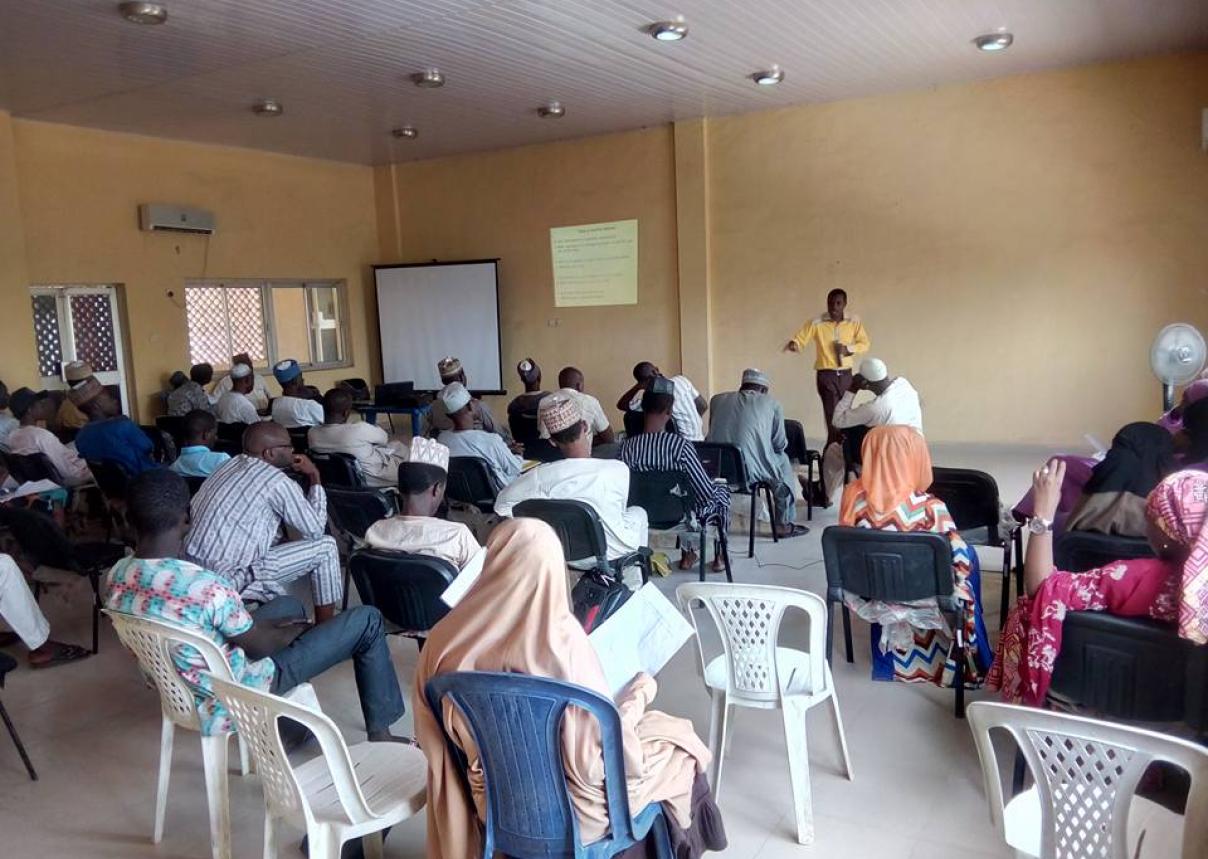
The Centre for Information Technology and Development (CITAD) held the second round of an internet safety and security workshop series in March 2017. The workshop, held at the NISTF Hall, Kano, was attended by 55 people including journalists, civil society activists, teachers and leaders of students for peace clubs supported by CITAD in tertiary institutions. Explaining the objectives of the workshop, Abdulganiyyu Rufai, programmes associate at CITAD, said that it had become necessary to raise awareness about internet safety and security as many people were increasingly falling prey to cybercrime through identity and personality theft, while many had experienced terrible confidentiality breaches.
The workshop was conducted in three sessions. The first session, entitled University Internet Safety and Security, was facilitated by Y. Z. Ya’u, the executive director of CITAD. He started by noting that given that the internet had become an indispensable part of our daily life, it was only logical that we insist that governments must accord it a formal recognition as a right. As a right and tool that we use daily, we must be able to navigate the various perils that could put as at risk, he added.
He observed that often safety and security are confused because they are related, and some use them interchangeably, but as they have evolved, they are actually used differently. Internet security, he said, "refers to the protection of the internet as a system - its functions, its databases, etc." Internet safety, on the other hand, relates to the protection of the individual users from harm. He sees insecurity itself as a threat to internet safety.
He then took the participants through the various points of perils, the consequences of safety and security breaches, as well as the various dimensions and manifestations of insecurity online. The session also drew attention to privacy issues, including the right to forget and the possible implications of the Internet of Things to privacy, and concluded by looking at emerging issues such as zero rating and net neutrality. He pointed out that Nigeria has no position on zero rating, which some mobile companies are currently providing, and activists needed to respond to this emerging "digital apartheid".
The second session, on managing cybersecurity and privacy issues, was led by Abdulganiyu Rufai, who explained some common threats and their consequences, such as viruses, spyware, etc. He looked at different types of attacks on networks and their countermeasures. He said such attacks were usually aimed at affecting either one or a combination of confidentiality, authenticity, integrity and system availability. He discussed how these attacks can occur, including interruption, which affects availability; interception, which undermines confidentiality of transactions; modification, which leads to lack of system integrity; and fabrication, which attacks system authenticity.
He concluded by imploring participants to implement seven cybersafety procedures that will "protect yourself, others, and your computer from many common threats." These seven safety measures include regularly updating software, running anti-virus always, taking precautions to avoid identity theft, and turning on personal firewalls. The others were avoiding spyware/adware, protecting passwords, and backing up important files.
In the final session, Kamal Umar, technical officer at CITAD, demonstrated various tips on how to surf the internet safely. Talking on the topic of "General Online Safety Tips", Umar started by drawing the attention of participants to the fact that learning to browse privately, a special feature of most browsers, was the foundation of safety online. He demonstrated how this can be done. He also explained the various security features of the browsers which users needed to pay attention to. He advised on installing add-ons that can steer you away from threats, and took participants through steps that help in protecting systems while downloading documents online.
He also discussed key safety and security assurance features that those doing online shopping should look for. For example, he drew attention to the difference between the Secure Hypertext Transfer Protocol (HTTPS) and the regular Hypertext Transfer Protocol (HTTP) as something to look for. He said it was also important to look at the website's Secure Socket Layer (SSL) Certificate, which is like a digital ID card that tells you that the website or web page is genuine.
He reinforced some of the safety measures discussed earlier, such as taking precautions for protecting your computer or mobile device, not conducting overly private activities when using public Wi-Fi, not allowing other people to use your computer/mobile phone, and making sure you format or delete computer/mobile phone content before selling a device or giving it away as a gift. He also gave tips on how to stay safe on social media sites.
At the end of the questions and answers session, a participant recommended that CITAD should mainstream internet safety and security in its regular training programmes. Responding, the training coordinator of CITAD, Malam Ahmad A. Yakasai, said that the suggestion was taken and that CITAD would look into how to implement it.
The following round of the workshop on internet safety and security was held in April for government officials. The first workshop in the series, which was meant for CITAD staff and associates, was held on 21 January 2017.
Image: Cross-section of participants at the workshop.